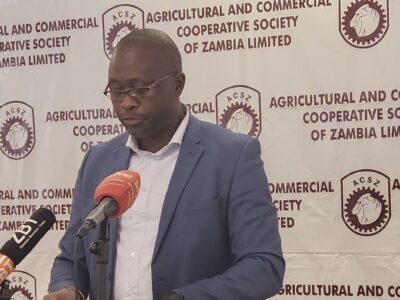The Zambia National Farmers Union (ZNFU) has called for the amendment of certain clauses in the Water Resources and Management (WARMA) Act of 2011 that hinder water harvesting.
ZNFU president, Jervis Zimba, said in view of the current drought, it was imperative that, among long term solutions, should be to provide incentives to farmers and amendment of some clauses in the Act.
Zimba in a statement stated that the incentives should be easy to access by farmers, including removal of legal impediments that exist in the WARMA Act of 2011.
He noted that irrigation was the key to sustainable farming and that the country needed to diversify its sources of energy.
“Farmers at all levels are committed to work with government to invest in irrigation and solar generated power but key to address should be the underlying causes for low investments in these areas in the past,” Zimba stated.
He said the union also welcomed the call by President Hakainde Hichilema for farmers to avail themselves to produce food this year to reduce on expected harvest deficit.
Zimba stated there was no doubt that the situation at hand was dire, hence the call by the President that there would be a multi–disciplinary team so that the country operated in a united effort.
“ZNFU looks forward to contributing to the efforts of the multi-disciplinary team that will be set up by government to mitigate this drought and national disaster,” he said.
Zimba stated that this was in order for farmer requirements to be supported for them to produce new crops and foods within the shortest possible time.
He also welcomed the declaration of drought as a national disaster by the President and the measures that would be taken to mitigate and resolve the negative effects of the drought.
“ZNFU is pleased that government will in view of this declaration, be re-aligning its resources to mitigate against the negative effects of the drought,” Zimba said.
He stated that the Union agreed that high on the agenda, among short-term measures in dealing with the drought of this magnitude, was to safeguard human food requirements and avoid mortality due to drought effects.
Zimba said this begs for deliberate efforts by government to have measures in place that would ensure that both human and animal life were taken care of.
“Therefore, animal feed requirements must be factored in when determining the shortfall of grain or other crops needed for feed stocks and government must ensure that number three meal is available in the country and at affordable prices for animals,” he advised.
Zimba noted that Livestock farmers suffered a setback from the outbreak of anthrax and could not afford skyrocketing input costs hence the need for government to take action in this area.
He commended government for prioritising local production and productivity by committing itself to purchase all locally produced staple food and to ascertain the deficit before considering importing additional maize and other crops into the country.
“This is commendable as the farmers would be disincentivised if their produce is not purchased timely. The Union embraces this and is available to participate in the team effort under the various streams that will be established,” Zimba said.
He stated that the Union’s desire would be to see that actions of the dialogue processes were implemented in a fast-paced manner synonymous with emergency as the situation demanded, so that the outcome would be felt.
WARNING! All rights reserved. This material, and other digital content on this website, may not be reproduced, published, broadcast, rewritten or redistributed in whole or in part without prior express permission from ZAMBIA MONITOR.













Comments